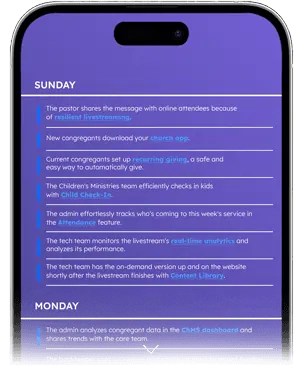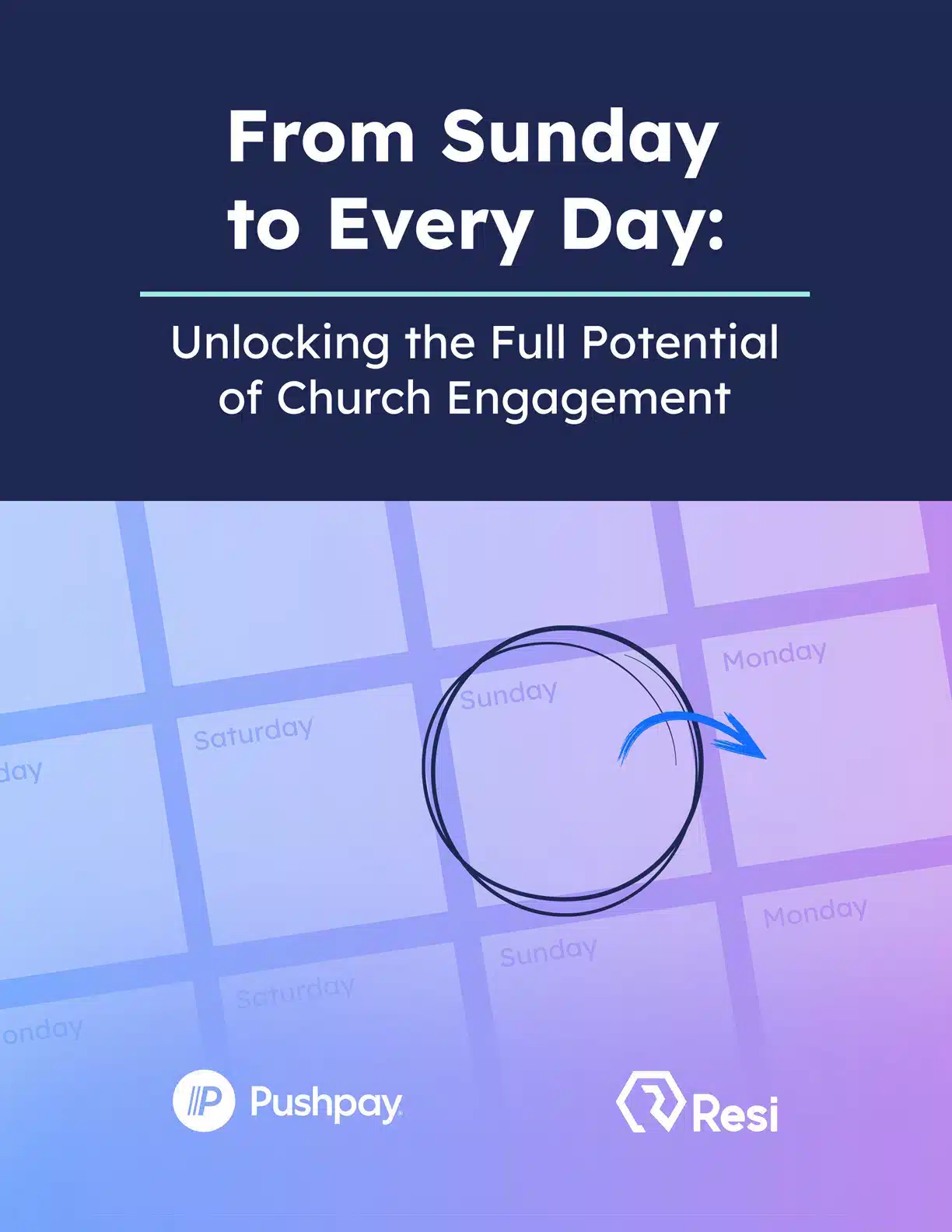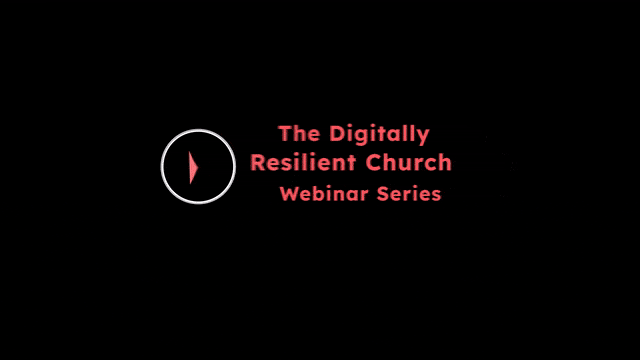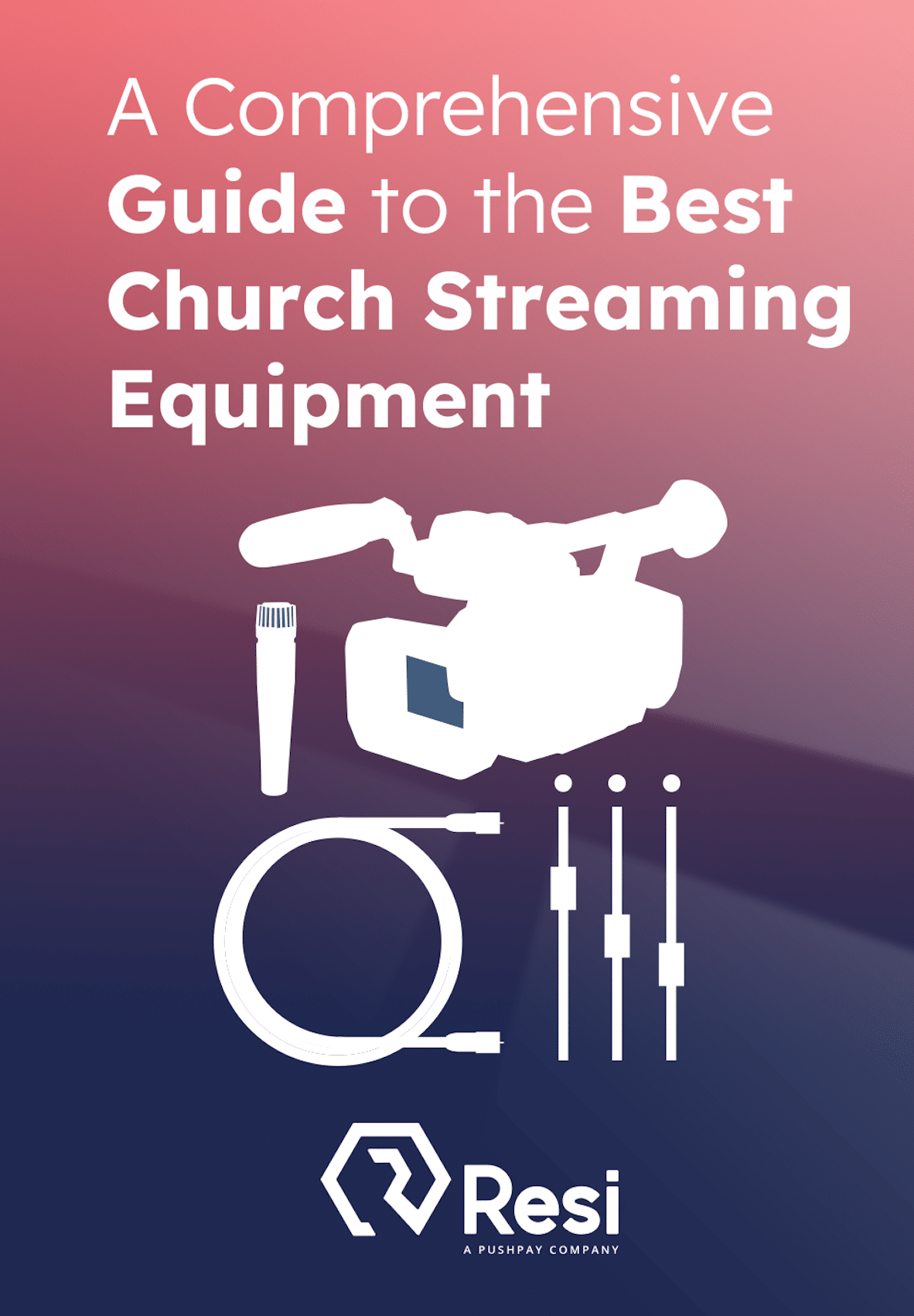
Did you know digital ministry can make your physical church’s discipleship better? With 91% of churches livestreaming, we spend a lot of time discussing and exploring new ways livestreaming church services can help pastors like you connect with visitors who check out your church digitally. We also talk about how livestreaming makes it easier for your regular attendees to stay connected to your church when (for whatever reason) they cannot attend physically.
Perfect attendance is not one of the fruits of the Spirit
But, the truth is, few people attend church every single week nowadays. Frankly, the concept of achieving 100% in-person attendance is becoming increasingly unrealistic. With kids’ commitments, work demands, travel plans, and side gigs, it’s challenging for individuals to make it to your physical church every Sunday at 9am.
So how do you meet your congregation where they are? The answer lies in using digital ministry to make it easy for them to engage with your message. ?
A Week in the Life
See how Pushpay and Resi can transform how you engage with your congregation.
Download infographic
Digital ministry is more important than you think
Recently, in an attempt to refine their digital ministry strategy, Crossroads Church in Cincinnati discovered something we think any church will find fascinating and worth talking about.
Crossroads examined the spiritual traits of attendees who were solely present in person, alongside those who participated both online and in person – the genuine hybrid attendees.
Surprisingly, their discoveries revealed that hybrid participants demonstrated a greater depth of discipleship compared to those who only attended in person. Digital engagement isn’t solely for the less motivated or introverted; it enhances traditional church settings. Embracing a hybrid model, blending physical and digital aspects, emerges as the optimal approach in 2025.
What does hybrid mean, anyway?
Hybrid is a funny word. We know from Pushpay’s State of Church Tech Report that in 2024, 90% of churches consider their ministry “hybrid.” But what does that mean? How much of a digital strategy makes your church hybrid? That’s not an easy question to answer, but the Crossroads standard is one we all should hold: Provide a digital strategy that makes your physical attendees better disciples.
Streaming your church services is the first step in creating a digital ministry strategy that can keep your church attendees connected when they miss a Sunday morning. Shaming or guilting Sunday attendance isn’t practical in 2024; instead, learn how your church can physically complement what it’s doing with digital to strengthen your discipleship process.
Digital engagement is the first step to building relationships, leading to discipleship
Streaming marks the initial and crucial step, yet achieving digital resilience for a church encompasses more than just broadcasting Sunday services online. Churches striving for digital resilience need to go beyond streaming and social media posts. The core of engagement involves connecting with someone new, which serves as the foundational step in nurturing a disciple-making bond. What does fostering such digital relationships entail?
- A relationship approach to digital discipleship
An increasing number of churches are transitioning to a relational approach to discipleship, proving highly effective in the digital realm. Platforms like social media, messaging apps, and texting offer convenient avenues for engaging in meaningful dialogues. The irony of the challenge posed in Hebrews 10:25, regarding “forsaking the gathering,” is evident as digital communities allow for profound connections, potentially surpassing those in physical spaces. While the early church in Acts 2:46 met daily—a feat challenging in today’s fast-paced society—it remains achievable through deliberate use of digital tools.
- How to connect digital discipleship and the physical church
The term “discipleship,” much like “hybrid,” carries various interpretations. It’s been said that if you asked five different pastors to define discipleship, you might get six different responses! Regardless of your personal perspective on disciple-making, the concept likely revolves around fostering “relationships” and “community” within your church. The good news is that both these elements can be incorporated digitally. Andy and Christian will present a range of simple yet effective strategies to enhance your church’s digital discipleship efforts. Our aim is to guide you in transforming your church into a digitally resilient community!
- How to start healthy and helpful engagement at your church
To cultivate discipleship, the initial focus is on engagement. How can we effectively communicate online to establish trust? In the realm of digital trust-building, posing questions triumphs over making assertions. Avoid passing judgment; invest time in understanding those you engage with. While seemingly straightforward, the challenge lies in aligning your team, including volunteers, with this approach.
From Sunday to Every Day
Download our FREE ebook to find out how your church can measure success in this engagement-centric culture.
Download for free!
And a bit of a pet peeve here: What conveys more empathy in an online conversation? Is the “prayer hands emoji” (?) or taking the time to write a three-sentence prayer? Digital is so “convenient” that taking the extra time to engage appropriately will go a long way to connect with people.
Understanding the Hesitations of Senior Leadership
If you’re not the decision maker at your church, being a digital ministry advocate can be an uphill battle. Before you barge down the door of leadership and have an emotional heart-to-heart tirade about your 27 reasons the church should be pursuing a digital strategy, stop. Breathe. Let’s evaluate the situation.
Here are a few questions that will help you handle the hesitations of leadership:
Question #1: Are the Objections “Theologically Based” in Leadership’s Mind?
It’s funny. If you ask pro-digital and anti-digital people, they’ll both use Hebrews 10:24-25 in their arguments: “And let us consider how we may spur one another on toward love and good deeds, not giving up meeting together.”
If their argument is grounded in their theology, ask yourself: “Do I have the respect of the leadership to change their theology?” Think of the years the pastor has spent studying and developing their theology. If you don’t have the proper level of respect (or relationship), you probably want to find someone to go into the conversation with you.
If the challenges to digital ministry are not theological, they are based on preferences. That’s good! Preferences are more accessible to change.
Preferences are merely opinions. They’re not always grounded in perceived Biblical facts and can be based on misconceptions. If this is the case, opinions can be swayed by information.
So, develop a heartfelt argument and state your case. But watch out. Sometimes, a preference is grounded in theological (or it’s a preference that leadership has labeled as a “theological”) opinion. If this happens, don’t argue whether it’s theological or not. You will need to have the conversation based on the theological rules.
Typical Challenges Church Leadership Will Ask About Digital Ministry
- Lazy people stay at home on Sundays. For church, we only count people who change out of their pajamas. – It’s true. Lazy people can attend online. But there are also many valid reasons people are not in the church building on Sunday 9 am. Don’t judge someone negatively because they stay tapped into your church digitally. This is a good thing. By the way, recognize that lazy people attend your physical church as well.
- Online creates consumeristic Christians. – It’s true. But the physical church creates consumeristic Christians, too. I’ll paraphrase James 1:22 a bit, where it says that we are not to be “Hearers of the word [online].” Instead, we must be “Doers of the word [in physical space].” Online is an amplifier. If you’re a consumeristic church physically, that will show up online. So, ask yourself, what type of church are you?
- Relationships aren’t real/genuine unless they involve interaction in physical space. – This argument often comes from an older generation that hasn’t experienced digital relationships or utilized digital tools. The younger generations, who are more native to digital technology, often do not feel this way. Also, people in corporate environments dealing with co-workers in different states or countries don’t feel this way. Biblically, we don’t see anything about the Holy Spirit being passed via air molecules. “Where two or more are gathered” (Matthew 18:20) can and does happen digitally.
- The Holy Spirit doesn’t work digitally. – This one always makes me smile because it’s absurd. Are we saying that God isn’t big enough to read and respond to what’s on a computer screen? That He can’t react to someone’s emotional or spiritual condition when they are typing on a keyboard or moving a mouse? Are we saying that the Internet inventors created a box God can’t or refuses to enter? Think about that. If man has created a space God cannot enter, then Satan has won! A God not on the Internet opens some major theological, world-altering issues.
Question #2: Why Are We Doing This? Using their Vision and Their Language to State Your Case
More than just sharing opinions, changing minds often requires stories to sway opinions. More specifically, stories of life change or stories of strategy from churches similar to yours, or ones from that next tier that your leadership wants to become.
Please don’t walk into your leadership telling stories and stats from “giga-churches”, especially if you are a 300-person generational church.
God is doing some incredible things through churches like Life.Church, but your church’s why (and your church leadership’s why) is most likely completely different from what Life.Church is doing. The challenge for you is to find churches with a mission/vision similar to yours and a similar size and celebrate their wins!
Even your posture in telling stories is not to brag or gloat about what other churches are doing. Remember the earlier challenge to “use your leadership’s language.” Your goal would be to say: “Our church has the opportunity to succeed in [doing whatever your mission is] by adopting a digital strategy. Churches like ours have adopted a similar strategy and have seen success doing it! Here’s a plan to experiment to get a proof of concept. Here’s how much it will cost and how much staff time we’ll need, and I’ve already pitched it to a dozen potential volunteers who are excited about it. Can we give this a try?”
Question #3: How Do We Test This? Creating a Pilot Project Proposal
One of the reasons your leadership doesn’t want to go “all in” with a digital strategy is the perception that they’re too busy, don’t have time, or don’t want more responsibility. Or, it’s a generational thing, and they don’t understand it!
None of these are wrong, necessarily. If these are true of your situation, you can certainly overcome these arguments over time. It does mean that, among other things, you will have to earn their trust.
You’ll need to understand that your church leadership might be more comfortable experimenting in small contexts before making the leap into more ambitious projects and strategies. Looking for some tips on developing your digital ministry experiment?
- Start small. Use free as much as possible. Get a simple proof of concept before you ask for big bucks or staffing. Don’t require much involvement from leadership.
- Stream services and talk about the people you meet. Typically, qualitative stories will be more potent initially than quantitative stats. Stories are your friend. Use stats to reinforce.
- Remember to use your leadership’s language. What do they value? Value that digitally, and tell them regularly how you’re succeeding.
- Involve Leadership as much as possible. Do not build this alone. Recruit staff and volunteers to be your first wave. People other than you will have a powerful voice as well.
- Don’t let your other job/responsibilities suffer. Running the experiment successfully cannot come to your other responsibilities’ detriment. Be successful on both fronts.
- When in doubt, start with the strategy your church does physically and then learn/iterate from that. Your physical strategy will likely not work digitally, but your leadership may need that proof of concept (the failure) to give freedom to do something else.
- Failure does not mean quitting. It means trying again. Learn from the experiment and develop a different process. Our priority is not to be correct but to see life change digitally. Change whatever you need to to see that happen.
- This will be a slow process. It needs to be. The journey is the reward, probably not for you, as you will likely hate the slow journey. The journey is the reward for your leadership. Internally, celebrate the wins as you see them grow to understand, appreciate, and support online ministry.
Digital ministry continues to evolve
In 2019, broadcasting church services online was met with skepticism by many. However, 2020 marked a turning point as the pandemic compelled numerous churches to swiftly embrace digital platforms. Even in 2025, with most churches continuing to stream services online, the pathway from digital engagement to physical ministry remains unfamiliar to many. Let Resi help you navigate new waters. Check out our many livestreaming resources to learn how churches like yours are leaning into digital ministry.







